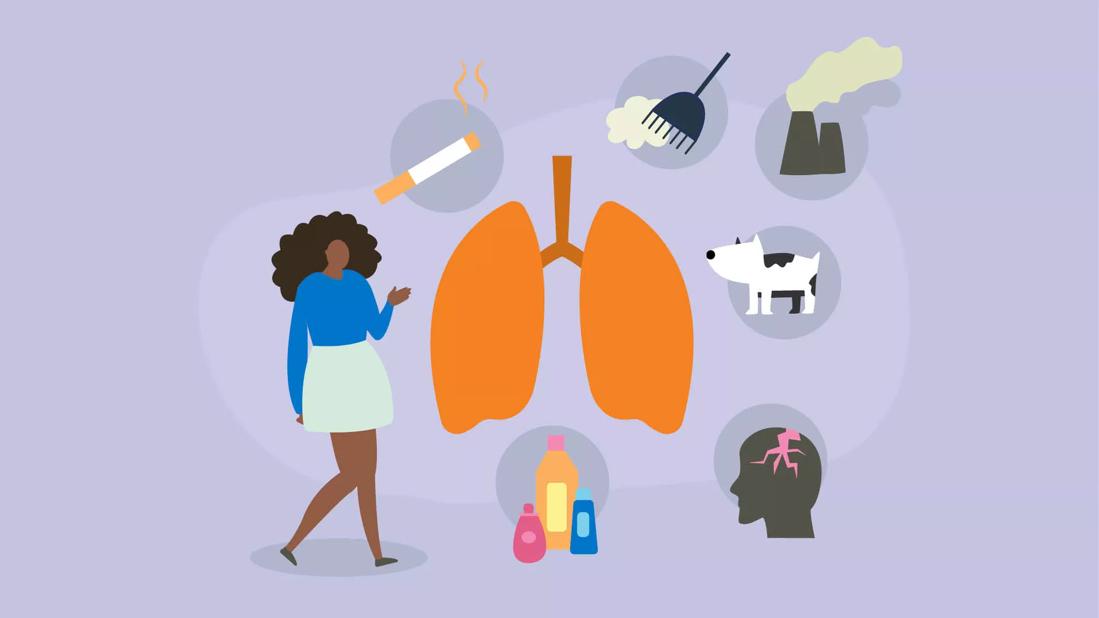Avoid triggers like dust, smoke and cold air to lessen your chances of coughing

Image content: This image is available to view online.
View image online (https://assets.clevelandclinic.org/transform/c1c549a8-3fce-4211-9cb1-befd21a5d6de/Stopping-Asthma-Cough-1180472057-967x544-1_jpg)
asthma triggers floating around a set of lungs and a person
You may be used to coughing when you have a cold or if your allergies are acting up, but for people who have asthma, they may also have to deal with an asthma cough.
Advertisement
Cleveland Clinic is a non-profit academic medical center. Advertising on our site helps support our mission. We do not endorse non-Cleveland Clinic products or services. Policy
When you have asthma, the airways in your lungs become swollen and inflamed. Your bronchial tubes react by squeezing tight. When this happens, you’re more likely to cough when encountering asthma triggers like dust, smoke and cold air.
Pulmonologist Emily Pennington, MD, explains how you can treat and lessen your chances of asthmatic coughing.
Are you coughing from asthma?
You may have heard of cough-variant asthma. How is it different from an asthma cough?
“Cough-variant asthma means that cough is the patient’s primary symptom from asthma,” explains Dr. Pennington. “But other patients can have a cough, plus other respiratory symptoms from their asthma.”
What does an asthma cough feel like?
“For some patients, it can be a dry cough, but then for other patients, they can produce phlegm or mucus from a cough,” Dr. Pennington further explains. “And one of the hallmarks of an asthma cough is that there’s specific triggers for the cough. You might notice that when you go out into the cold air or you’re around dust, animal dander or smoke, that triggers a cough.”
Those triggers cause inflammation in your airways, which causes you to cough.
Symptoms of an asthma cough can vary. Those symptoms may include:
Advertisement
But if you just have cough-variant asthma, a cough is your only symptom.
What about at night — can you experience an asthma cough at night?
“It’s common for an asthma cough to be worse at night, and even wake you up from sleep,” clarifies Dr. Pennington.
If you have asthma, your main course of treatment may be an inhaler.
“There’s also a small number of pill medications you might be on but primarily, it’s inhalers,” says Dr. Pennington.
Corticosteroid inhalers are the main type of treatment for asthma. You may also be prescribed short-acting bronchodilators such as Albuterol, which is considered a rescue inhaler that you would use in an emergency.
Dr. Pennington says it’s important to think about having an asthma attack or an asthma cough before it happens. She suggests coming up with an asthma action plan.
“An asthma action plan is guidelines that your healthcare provider will give you to follow if your asthma symptoms get worse,” says Dr. Pennington.
The guidelines can explain how to stop an asthmatic cough by including how frequently you should be using inhalers or taking oral steroids, as well as when to call your doctor’s office.
Yes, says Dr. Pennington.
“It’s important that you take your inhaler medications as prescribed,” she emphasizes. “That might include a daily controller inhaler and a rescue inhaler that you can use to quickly stop the cough if it starts.”
Video content: This video is available to watch online.
View video online (https://cdnapisec.kaltura.com/p/2207941/sp/220794100/playManifest/entryId/1_vwz1w64t/flavorId/1_5f3sgelj/format/url/protocol/https/a.mp4)
Inhalers are small, handheld devices that allow you to breathe medicine in through your mouth, directly to your lungs.
While doctors aren’t sure why some people get asthma, and can’t prevent it or an asthma cough from happening, there are things you can do to lessen your chances of having an asthma cough.
Dr. Pennington says the best thing you can do is avoid any triggers like:
You may need to wear a face mask around dust and chemicals, and if you smoke, Dr. Pennington says it’s vital that you stop.
She also says, “If cold air triggers your asthma cough, try covering your mouth with a scarf or a mask when you're outside.”
Other factors like your weight can impact your asthma as well.
“Obesity increases inflammation in the body, which can make asthma more difficult to control or can cause poor control of asthma,” she explains.
Another thing you can do to manage your asthma cough? Consider what you eat.
“Eating a healthy diet can help with asthma control,” states Dr. Pennington. “A diet high in fruits and vegetables and low in processed foods improve asthma control.”
Advertisement
Having an asthma cough can be frustrating and annoying. But with the right treatment and lifestyle changes, you can successfully manage your asthma cough.
“The big things you can do to lower your risk of an asthma cough is to use your inhalers and avoid triggers,” reiterates Dr. Pennington.
Advertisement

Sign up for our Health Essentials emails for expert guidance on nutrition, fitness, sleep, skin care and more.
Learn more about our editorial process.
Advertisement
Wearing a scarf, adjusting your outdoor activities and following your asthma treatment plan can help limit breathing problems
Adult-onset asthma has the same symptoms as childhood asthma, but tends to be more severe
An asthma action plan is a personalized, step-by-step set of instructions for handling asthma attacks
Checking the weather, pollen counts and air quality can help you avoid asthma triggers
Stress can trigger and worsen asthma symptoms, like coughing and shortness of breath
Smoking, including secondhand smoke, can worsen your asthma triggers and damage your airways
Nighttime asthma attacks can be due to acid reflux, allergens and hormonal changes, but treatment can help prevent them
The effectiveness and safety of many of these options are unknown, so it’s best to stick to traditional care
Prioritize your health by managing stress, strengthening your social connections and getting quality sleep
Bolsters, blankets, pillows and blocks can offer extra support, stability and comfort
Allergies, postnasal drip, asthma or reflux could be to blame for a cough that won’t quit